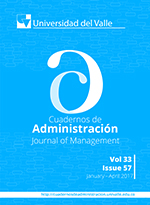Cultural analysis in three indigenous productive organizations from an interpretive-symbolic perspective
Main Article Content
Most cultural scientific studies in Colombian organizations have been characterized as being deterministic and by establishing cultural typologies, according to the analysis of internal and external organizational variables. Additionally, most of these studies are oriented towards considering Colombian organizations within modern westernized contexts as the unit of analysis, leaving out of the scientific discussion, the traditional Colombian organizations that have been designed and developed from native perspectives and grounded in the ancient cultures of the country. In contrast, this research defined three indigenous productive organizations as units of analysis to describe and characterize their culture from an interpretative-symbolic perspective, analyzing their own cultural features and components based on the theoretical model of cultural dynamics. The methodology is based on organizational ethnography and cultural analysis of emerging categories. The results show that although there are points where three indigenous productive organizations meet regarding material, intangible and social aspects, every organization has its own cultural characteristics that defines as “indigenous-traditional” or “western-modern”.
Accepted 2017-04-18
Published 2017-10-05





